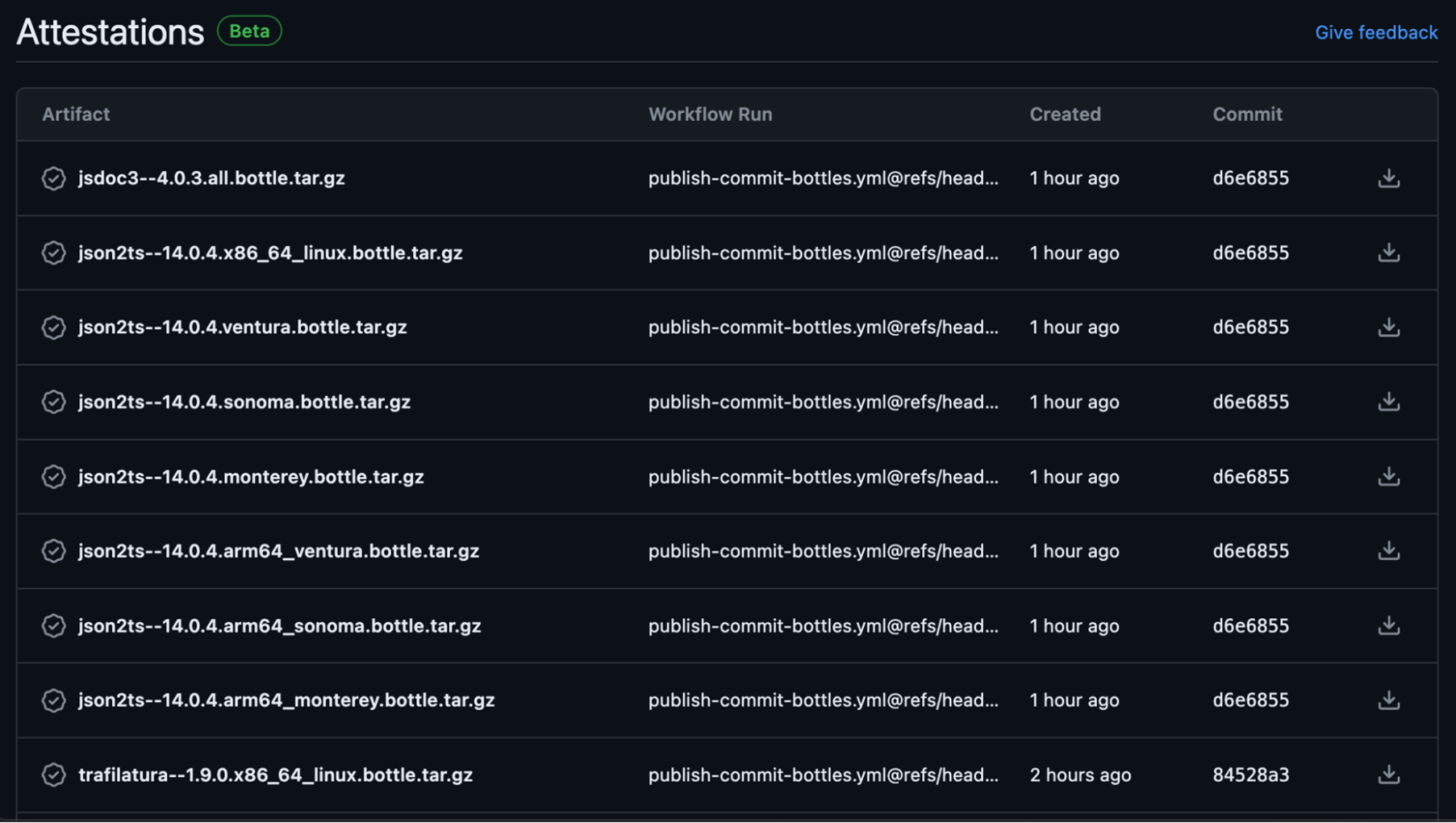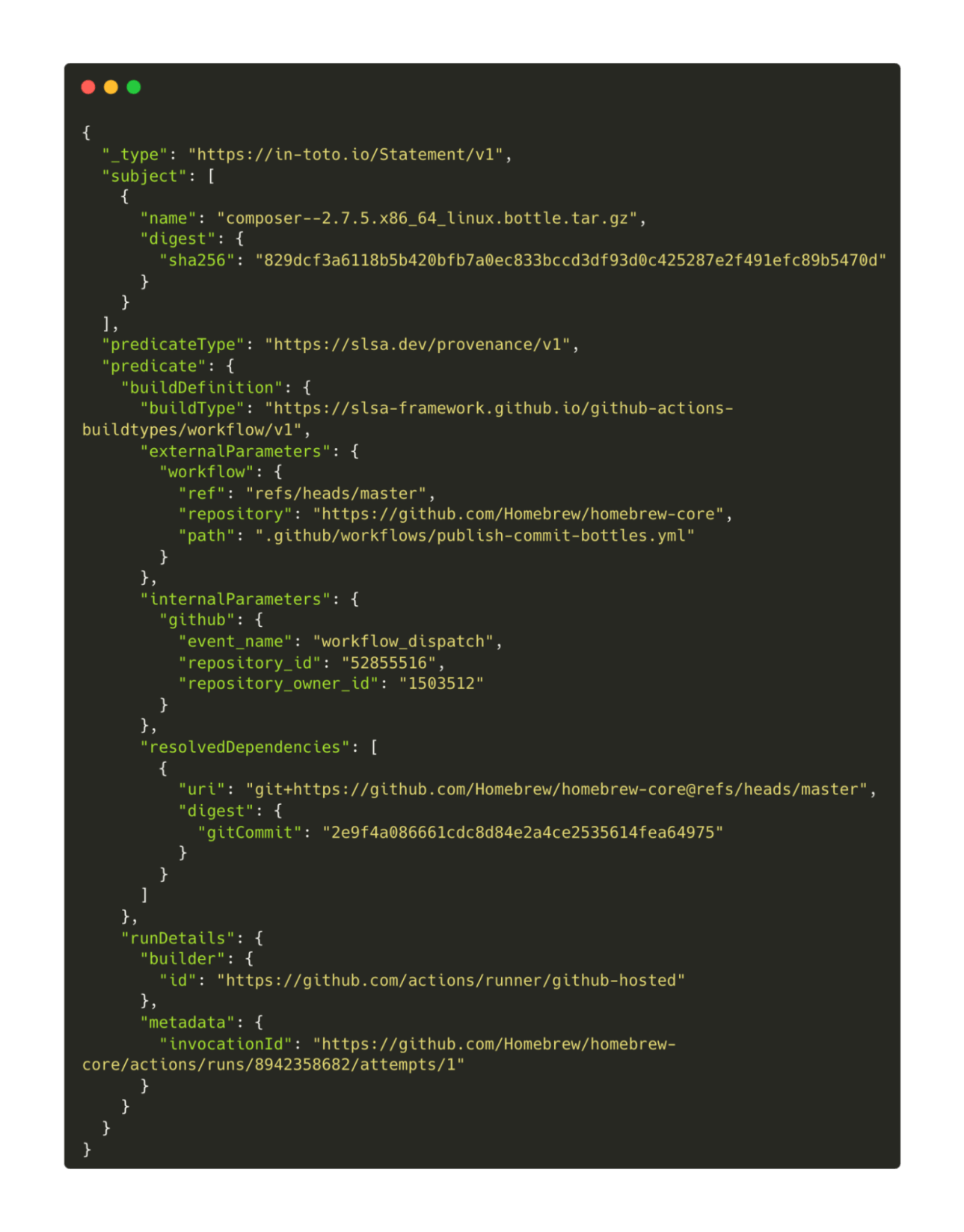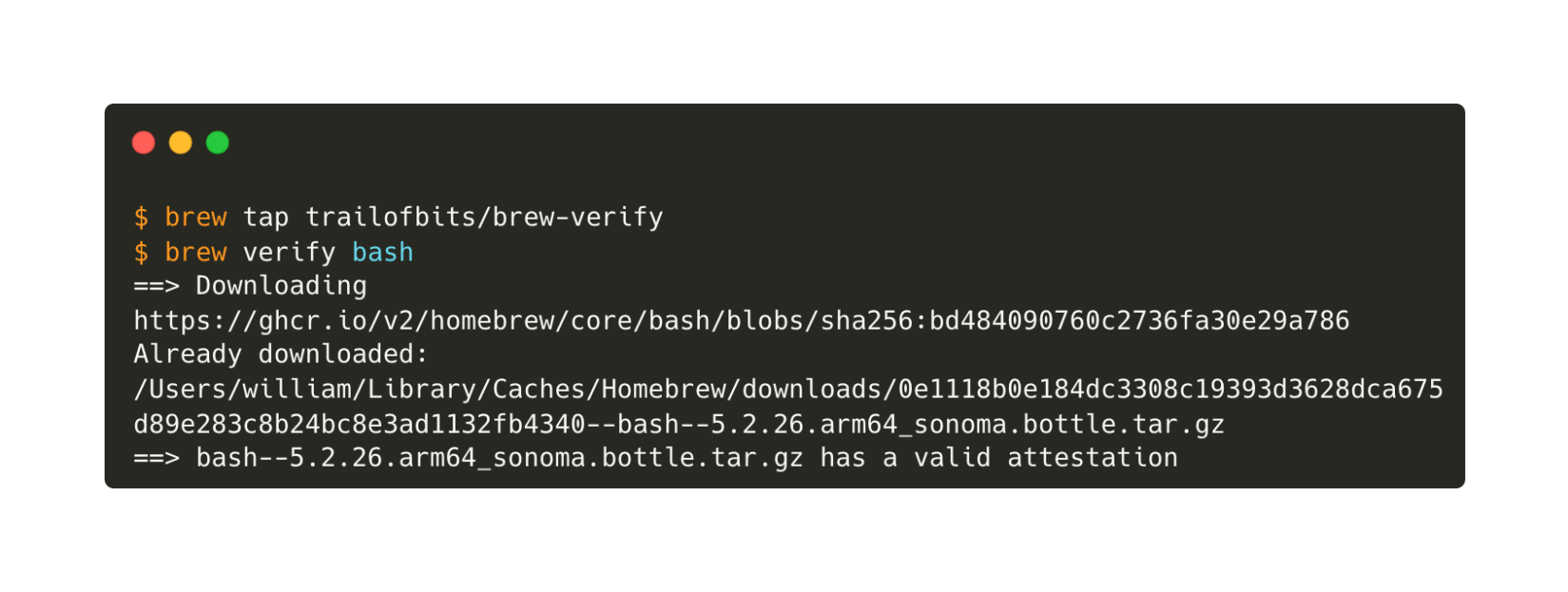By Joe Sweeney and William Woodruff
Last November, we announced our collaboration with Alpha-Omega and OpenSSF to add build provenance to Homebrew.
Today, we are pleased to announce that the core of that work is live and in public beta: homebrew-core is now cryptographically attesting to all bottles built in the official Homebrew CI. You can verify these attestations with our (currently external, but soon upstreamed) brew verify command, which you can install from our tap:

This means that, from now on, each bottle built by Homebrew will come with a cryptographically verifiable statement binding the bottle’s content to the specific workflow and other build-time metadata that produced it. This metadata includes (among other things) the git commit and GitHub Actions run ID for the workflow that produced the bottle, making it a SLSA Build L2-compatible attestation:

In effect, this injects greater transparency into the Homebrew build process, and diminishes the threat posed by a compromised or malicious insider by making it impossible to trick ordinary users into installing non-CI-built bottles.
This work is still in early beta, and involves features and components still under active development within both Homebrew and GitHub. As such, we don’t recommend that ordinary users begin to verify provenance attestations quite yet.
For the adventurous, however, read on!
A quick Homebrew recap
Homebrew is an open-source package manager for macOS and Linux. Homebrew’s crown jewel is homebrew-core, a default repository of over 7,000 curated open-source packages that ship by default with the rest of Homebrew. homebrew-core’s packages are downloaded hundreds of millions of times each year, and form the baseline tool suite (node, openssl, python, go, etc.) for programmers using macOS for development.
One of Homebrew’s core features is its use of bottles: precompiled binary distributions of each package that speed up brew install and ensure its consistency between individual machines. When a new formula (the machine-readable description of how the package is built) is updated or added to homebrew-core, Homebrew’s CI (orchestrated through BrewTestBot) automatically triggers a process to create these bottles.
After a bottle is successfully built and tested, it’s time for distribution. BrewTestBot takes the compiled bottle and uploads it to GitHub Packages, Homebrew’s chosen hosting service for homebrew-core. This step ensures that users can access and download the latest software version directly through Homebrew’s command-line interface. Finally, BrewTestBot updates references to the changes formula to include the latest bottle builds, ensuring that users receive the updated bottle upon their next brew update.
In sum: Homebrew’s bottle automation increases the reliability of homebrew-core by removing humans from the software building process. In doing so, it also eliminates one specific kind of supply chain risk: by lifting bottle builds away from individual Homebrew maintainers into the Homebrew CI, it reduces the likelihood that a maintainer’s compromised development machine could be used to launch an attack against the larger Homebrew user base1.
At the same time, there are other aspects of this scheme that an attacker could exploit: an attacker with sufficient permissions could potentially upload malicious builds directly to homebrew-core’s bottle storage, potentially leveraging alert fatigue to trick users into installing despite a checksum mismatch. More concerningly, a compromised or rogue Homebrew maintainer could surreptitiously replace both the bottle and its checksum, resulting in silently compromised installs for all users onwards.
This scenario is a singular but nonetheless serious weakness in the software supply chain, one that is well addressed by build provenance.
Build provenance
In a nutshell, build provenance provides cryptographically verifiable evidence that a software package was actually built by the expected “build identity” and not tampered with or secretly inserted by a privileged attacker. In effect, build provenance offers the integrity properties of a strong cryptographic digest, combined with an assertion that the artifact was produced by a publicly auditable piece of build infrastructure.
In the case of Homebrew, that “build identity” is a GitHub Actions workflow, meaning that the provenance for every bottle build attests to valuable pieces of metadata like the GitHub owner and repository, the branch that the workflow was triggered from, the event that triggered the workflow, and even the exact git commit that the workflow ran from.
This data (and more!) is encapsulated in a machine-readable in-toto statement, giving downstream consumers the ability to express complex policies over individual attestations:

Build provenance and provenance more generally are not panaceas: they aren’t a substitute for application-level protections against software downgrades or confusion attacks, and they can’t prevent “private conversation with Satan” scenarios where the software itself is malicious or compromised.
Despite this, provenance is a valuable building block for auditable supply chains: it forces attackers into the open by committing them to public artifacts on a publicly verifiable timeline, and reduces the number of opaque format conversions that an attacker can hide their payload in. This is especially salient in cases like the recent xz-utils backdoor, where the attacker used a disconnect between the upstream source repository and backdoored tarball distribution to maintain their attack’s stealth. Or in other words: build provenance won’t stop a fully malicious maintainer, but it will force their attack into the open for review and incident response.
Our implementation
Our implementation of build provenance for Homebrew is built on GitHub’s new artifact attestations feature. We were given early (private beta) access to the feature, including the generate-build-provenance action and gh attestation CLI, which allowed us to iterate rapidly on a design that could be easily integrated into Homebrew’s pre-existing CI.
This gives us build provenance for all current and future bottle builds, but we were left with a problem: Homebrew has a long “tail” of pre-existing bottles that are still referenced in formulae, including bottles built on (architecture, OS version) tuples that are no longer supported by GitHub Actions2. This tail is used extensively, leaving us with a dilemma:
- Attempt to rebuild all old bottles. This is technically and logistically infeasible, both due to the changes in GitHub Actions’ own supported runners and significant toolchain changes between macOS versions.
- Only verify a bottle’s build provenance if present. This would effectively punch a hole in the intended security contract for build provenance, allowing an attacker to downgrade to a lower degree of integrity simply by stripping off any provenance metadata.
Neither of these solutions was workable, so we sought a third. Instead of either rebuilding the world or selectively verifying, we decided to create a set of backfilled build attestations, signed by a completely different repository (our tap) and workflow. With a backfilled attestation behind each bottle, verification looks like a waterfall:
- We first check for build provenance tied to the “upstream” repository with the expected workflow, i.e.
Homebrew/homebrew-corewithpublish-commit-bottles.yml. - If the “upstream” provenance is not present, we check for a backfilled attestation before a specified cutoff date from the backfill identity, i.e.
trailofbits/homebrew-brew-verifywithbackfill_signatures.yml. - If neither is present, then we produce a hard failure.
This gives us the best of both worlds: the backfill allows us to uniformly fail if no provenance or attestation is present (eliminating downgrades), without having to rebuild every old homebrew-core bottle. The cutoff date then adds an additional layer of assurance, preventing an attacker from attempting to use the backfill attestation to inject an unexpected bottle.
We expect the tail of backfilled bottle attestations to decrease over time, as formulae turn over towards newer versions. Once all reachable bottles are fully turned over, Homebrew will be able to remove the backfill check entirely and assert perfect provenance coverage!
Verifying provenance today
As mentioned above: this feature is in an early beta. We’re still working out known performance and UX issues; as such, we do not recommend that ordinary users try it yet.
With that being said, adventuresome early adopters can give it a try with two different interfaces:
- A dedicated
brew verifycommand, available via our third-party tap - An early upstream integration into
brew installitself.
For brew verify, simply install our third-party tap. Once installed, the brew verify subcommand will become usable:
brew update brew tap trailofbits/homebrew-brew-verify brew verify --help brew verify bash
Going forward, we’ll be working with Homebrew to upstream brew verify directly into brew as a developer command.
For brew install itself, set HOMEBREW_VERIFY_ATTESTATIONS=1 in your environment:
brew update export HOMEBREW_VERIFY_ATTESTATIONS=1 brew install cowsay
Regardless of how you choose to experiment with this new features, certain caveats apply:
- Both
brew verifyandbrew installwrap the gh CLI internally, and will bootstrapghlocally if it isn’t already installed. We intend to replace our use ofgh attestationwith a pure-Ruby verifier in the medium term. - The build provenance beta depends on authenticated GitHub API endpoints, meaning that
ghmust have access to a suitable access credential. If you experience initial failures withbrew verifyorbrew install, try runninggh auth loginor settingHOMEBREW_GITHUB_API_TOKENto a personal access token with minimal permissions.
If you hit a bug or unexpected behavior while experimenting with brew install, please report it! Similarly, for brew verify: please send any reports directly to us.
Looking forward
Everything above concerns homebrew-core, the official repository of Homebrew formulae. But Homebrew also supports third-party repositories (“taps”), which provide a minority–but–significant number of overall bottle installs. These repositories also deserve build provenance, and we have ideas for accomplishing that!
Further out, we plan to take a stab at source provenance as well: Homebrew’s formulae already hash-pin their source artifacts, but we can go a step further and additionally assert that source artifacts are produced by the repository (or other signing identity) that’s latent in their URL or otherwise embedded into the formula specification. This will compose nicely with GitHub’s artifact attestations, enabling a hypothetical DSL:

Stay tuned for further updates in this space and, as always, don’t hesitate to contact us! We’re interested in collaborating on similar improvements for other open-source packaging ecosystems, and would love to hear from you.
Last but not least, we’d like to offer our gratitude to Homebrew’s maintainers for their development and review throughout the process. We’d also like to thank Dustin Ingram for his authorship and design on the original proposal, the GitHub Package Security team, as well as Michael Winser and the rest of Alpha-Omega for their vision and support for a better, more secure software supply chain.
1In the not-too-distant past, Homebrew’s bottles were produced by maintainers on their own development machines and uploaded to a shared Bintray account. Mike McQuaid’s 2023 talk provides an excellent overview on the history of Homebrew’s transition to CI/CD builds.
2Or easy to provide with self-hosted runners, which Homebrew uses for some builds.
